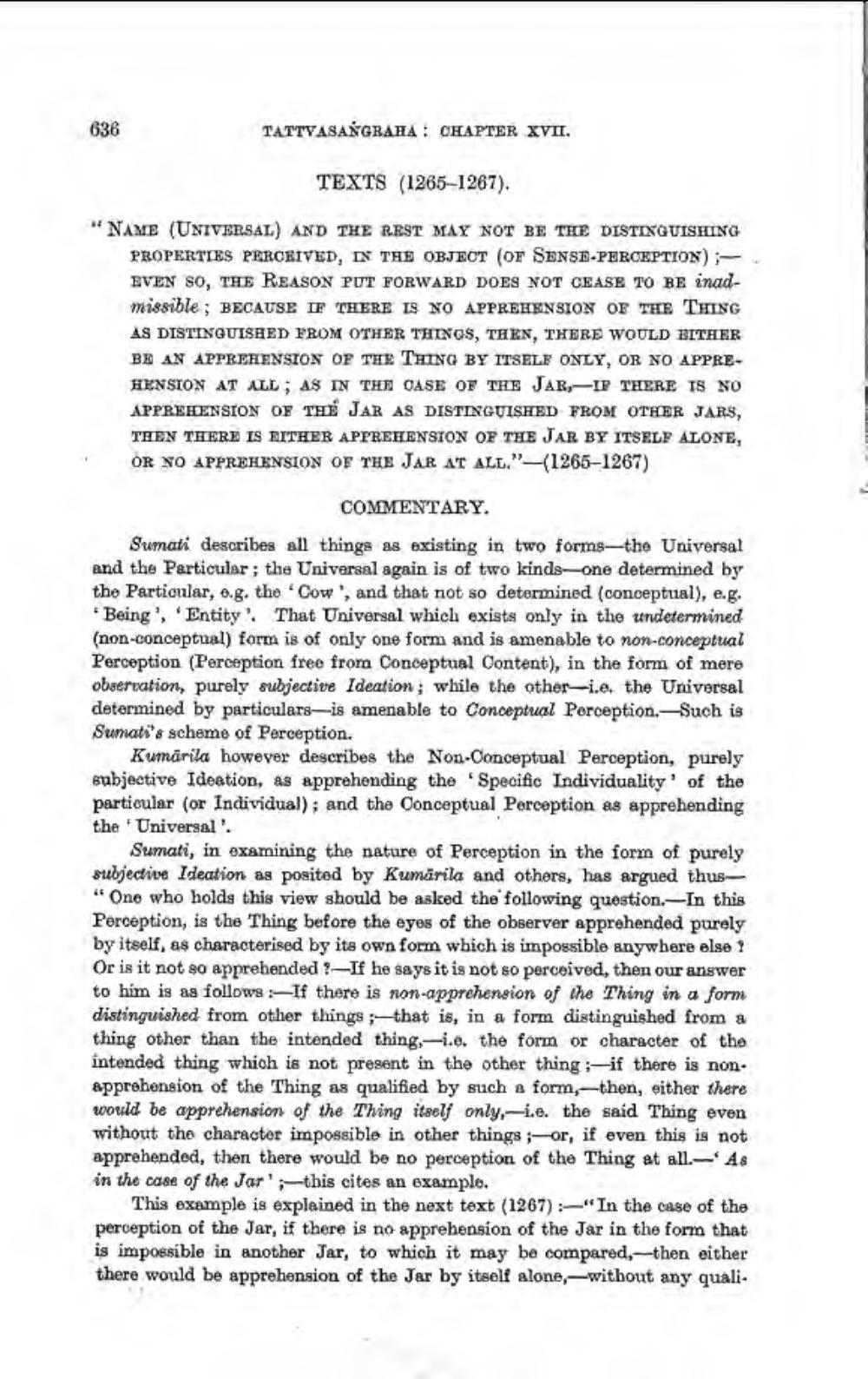________________
636
TATTVASANGRAHA CHAPTER XVII.
TEXTS (1265-1267).
" NAME (UNIVERSAL) AND THE REST MAY NOT BE THE DISTINGUISHING
PROPERTIES PERCEIVED, IN THE OBJECT (OF SENSE-PERCEPTION) - EVEN SO, THE REASON PUT FORWARD DOES NOT CEASE TO BE inadmissible ; BECAUSE IF THERE IS NO APPREHENSION OF THE THING AS DISTINGUISHED FROM OTHER THINGS, THEN, THERE WOULD BITHER BE AN APPREHENSION OF THE THING BY ITSELF ONLY, OR NO APPREHENSION AT ALL; A$ IN THE CASE OF THE JAR,—IF THERE IS NO APPREHENSION OF THE JAR AS DISTINGUISHED FROM OTHER JARS, THEN THERE IS EITHER APPREHENSION OF THE JAR BY ITSELF ALONE, OR NO APPREHENSION OF THE JAR AT ALL."-(1265-1267)
COMMENTARY.
Sumati describes all things as existing in two forms-the Universal and the Particular; the Universal again is of two kinds-one determined by the Particular, o.g. the Cow, and that not so determined (conceptual), e.g.
Being , 'Entity! That Universal which exists only in the undetermined (non-conceptual) form is of only one form and is amenable to non-conceptual Perception (Perception free from Conceptual Content), in the form of mere observation, purely subjective Ideation; while the other-i.e. the Universal determined by particulars—is amenable to Conceptual Perception.-Such is Sumatis scheme of Perception.
Kumarila however describes the Non-Conceptual Perception, purely subjective Ideation, as apprehending the Specific Individuality of the particular (or Individual); and the Conceptual Perception as apprehending the Universal '.
Sumati, in examining the nature of Perception in the form of purely subjective Ideation as posited by Kumärila and others, has argued thus"One who holds this view should be asked the following question. In this Perception, is the Thing before the eyes of the observer apprehended purely by itself, as characterised by its own form which is impossible anywhere else? Or is it not so apprehended ?-If he says it is not so perceived, then our answer to him is as follows - If there is non-apprehension of the Thing in a form distinguished from other things that is, in a form distinguished from a thing other than the intended thing, i.e. the form or character of the intended thing which is not present in the other thing :-if there is non. apprehension of the Thing as qualified by such a form, -then, either there would be apprehension of the Thing itself only,-i.e. the said Thing even without the character impossible in other things or, if even this is not apprehended, then there would be no perception of the Thing at all. As in the case of the Jar',this cites an examplo.
This example is explained in the next text (1267) "In the case of the perception of the Jar, if there is no apprehension of the Jar in the form that is impossible in another Jar, to which it may be compared, then either there would be apprehension of the Jar by itself alone,-without any quali.




